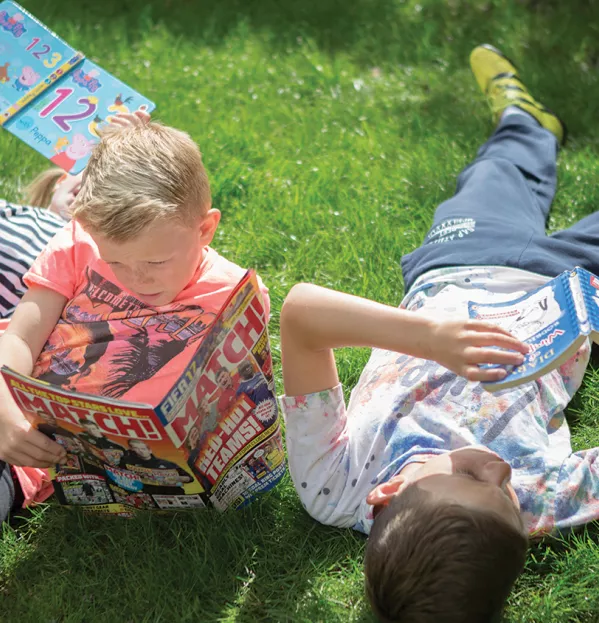- Home
- Teaching & Learning
- General
- Literacy: Give pupils books they actually want to read
Literacy: Give pupils books they actually want to read

Did you know beavers have see-through eyelids that act like goggles? Or that Queen Victoria slammed the piano lid down on her music teacher’s fingers when she was a child because he told her she “must practise” ? Or that Italy - before their win earlier this month - last won the Euros in 1968?
I did, because my 10-year-old son is full of facts. Why? Because he likes to read - from novels and comics to the Horrible Histories series and the annual Guinness World Records book, he consumes it all. But it doesn’t end there.
He reads the back of old DVDs and the leaflets inside them - an old collection of James Bond movies means he knows who the American film producer Cubby Broccoli is and how they filmed that scene in Live and Let Die in which 007 turns crocodiles into a makeshift bridge over a swamp.
His Euro 2020 sticker book means he has facts about all the countries that have triumphed in that competition at his fingertips - but he also has a grasp of contemporary European history, thanks to the mentions of places such as West Germany and the USSR, which sparked questions. (A lot of questions.)
So Jennifer Milne’s online piece for Tes Scotland earlier this month, in which she made the case for literacy being the focus of the drive to close the attainment gap, rang true with this parent. My ears might be bleeding - my son doesn’t just like to hoover up facts but also likes to share what he knows - but that his general knowledge is mushrooming just because he can read fluently is indisputable.
According to Milne, a principal teacher of English at Fife Council and an associate tutor at the University of Glasgow: “Literacy is the key that opens the door to all other aspects of the curriculum.”
But, of course, not all children get the same opportunity to read. Her research finds that from March 2020 to June 2021, around a quarter of secondary school students read more and around a quarter read less. Those who read more were the young people who had support and access to books at home during the pandemic; those young people with less support and access to reading at home, meanwhile, read less.
Milne concludes: “Literacy is the heart of the curriculum and must be given its place at the centre if we are to see a decrease in the poverty-related attainment gap as we strive for recovery from Covid-19.”
Teachers will be well aware that reading isn’t just an end in itself but a means of acquiring knowledge on every subject imaginable - so what gets in the way of prioritising literacy and having an unapologetic focus on honing these skills? Do classroom teachers lack the freedom to make literacy the focus? Or is it more that in classes of up to 33 pupils - when around a fifth will have a diagnosed additional support need - teachers lack the time to support children in their reading?
Back in 2017, literacy expert Sue Ellis - who was leading a programme in Renfrewshire primaries to boost literacy rates - told Tes Scotland that what often got in the way of improving literacy was quick-fix solutions that promised the world when actually what was needed was an approach that improved teachers’ skills.
In that particular programme, teachers were asked to team-teach a child struggling to read for 10 weeks with the support of people who were expert in reading, so that they could figure out what hadn’t worked for that pupil, what needed to be done and then apply that learning to all their pupils.
Ellis emphasised the need to gauge every child’s reading level accurately so that the text they were reading was neither too easy nor too challenging, as well as ensuring that children were actually interested in what they were reading. She warned that pupils’ persistence is low when they do not enjoy what they read - particularly if they come from a disadvantaged background.
Grisly facts about history, football statistics and the ins and outs of making movies won’t be for everyone, but a reading scheme book seems unlikely to result in the same level of engagement as a text carefully chosen by a teacher who knows the pupil’s ability - and their interests - better than most.
As ever, we need to invest in, and listen to, teachers if we want to give all children the opportunity to get lost in books, DVD covers, cereal packets - or any other source of text that might spark a lifelong love of reading.
Emma Seith is a reporter at Tes Scotland. She tweets @Emma_Seith
This article originally appeared in the 30 July 2021 issue under the headline “Matchmaking pupils with books can spark a lifelong commitment”
You need a Tes subscription to read this article
Subscribe now to read this article and get other subscriber-only content:
- Unlimited access to all Tes magazine content
- Exclusive subscriber-only stories
- Award-winning email newsletters
Already a subscriber? Log in
You need a subscription to read this article
Subscribe now to read this article and get other subscriber-only content, including:
- Unlimited access to all Tes magazine content
- Exclusive subscriber-only stories
- Award-winning email newsletters
topics in this article



